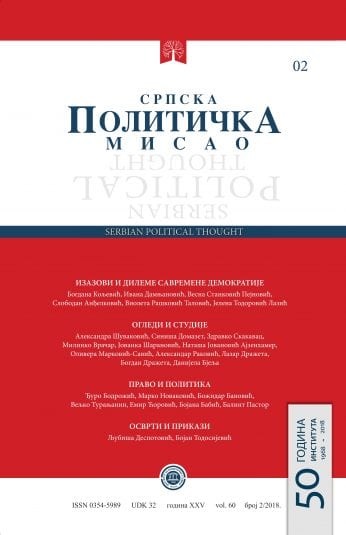Посматрање изборних циклуса у Србији 2012–2017. године: кључни актери, налази и препоруке
Observation of 2012–2017 Election Cycles in Serbia: Key Actors, Findings and Recommendations
Author(s): Slađana MladenovićSubject(s): Governance, Electoral systems, Politics and communication
Published by: Институт за политичке студије
Keywords: presidential elections in Serbia; parliamentary elections in Serbia; election observation in Serbia; financing the electoral campaign; media in electoral campaign; professionalisation of the Republic
Summary/Abstract: The findings of the 2012–2017 election cycles observations show that the normative framework formally provides a solid basis for holding free elections, but that its incomplete implementation and the lack of oversight during the pre-election campaign generate an increase in the inequality of the election participants and call into question the achievement of conditions for fair elections. In fact, the conditions are the worst in the so-called side electoral arenas: 1) the financing of the pre-election campaign is not transparent, and the inequality of the participants regarding the available funds increases, with the participation of the ruling parties exceeding 70%; 2) in the media sphere, in terms of ownership there is a financial and personal connection between the privatised local media and the parties, while in the electronic media with the national frequency and the most influential daily and weekly newspapers there are “two-floor elections” with complete domination of the Serbian progressive party and its president, party camera phenomenon, functionary campaign and the lack of critical role; and 3) observers regularly record dozens of cases of misuse of public resources for party purposes. There is no genuine oversight over the election process, since the Supervisory Board envisaged by the law has never been formed, while the regulatory bodies such as the Anti Corruption Agency and the Regulatory Authority for Electronic Media are becoming more passive, working under the influence of the ruling parties and without the ability to prevent their abuses in the electoral process. The only aspect of the electoral process that is not under the full monopoly of the ruling parties is the Republic Electoral Commission, but observers recommend its professionalisation, which would de facto transfer the control over its work from the hands of all parliamentary parties and electoral lists into the hands of the ruling parties.
Journal: Српска политичка мисао
- Issue Year: 2018
- Issue No: 4
- Page Range: 141-167
- Page Count: 27
- Language: Serbian

